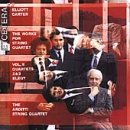| All Artists: Arditti String Quartet Title: Elliott Carter: The Works for String Quartet, Volume 2 Members Wishing: 2 Total Copies: 0 Label: Et'Cetera Original Release Date: 3/22/2004 Release Date: 3/22/2004 Album Type: Import Genre: Classical Styles: Chamber Music, Historical Periods, Classical (c.1770-1830) Number of Discs: 1 SwapaCD Credits: 1 UPC: 750582120923 |
Search - Arditti String Quartet :: Elliott Carter: The Works for String Quartet, Volume 2
 | Arditti String Quartet Elliott Carter: The Works for String Quartet, Volume 2 Genre: Classical
|
Larger Image |
CD Details |
CD ReviewsRough bowing, smoothe bowing Joe Barron | Philadelphia, PA, | 05/25/2001 (4 out of 5 stars) "It is interesing to contrast this recording of Carter's Second and Third quartets with that of the Juilliard--both are excellent and worth owning, but this one underscores the stylistic continuity of the two pieces in rather a startling fashion. Where Mann and company offer a warm, almost Mozartean rendering of the Second and dig into the Third as hard as they can, Arditti and friends give a comparatively robust reading of the Second and a smoother reading of the Third. I daresay the latter is almost mellifluous, especially in the scorrevole passages. One can see how one quartet sprang from the other. They sound like the offspring of a single mind, rather than contrasting evolutions from different planets. The Elegy is a bonus and a treat-- a pretty piece from Carter's neoclassical period, much in the mood of Barber's Adagio, but with more muscle and greater contrast in tempos and textures.All in all, a worthy addition to the Carter discography." Third massive and grandiose to the contracted Second scarecrow | Chicago, Illinois United States | 08/07/2000 (5 out of 5 stars) "Carter's Second Quartet inhabits the shadow of the groundbreaking First Quartet, where a virtual rethinking of the genre occurred, Carter while in the quietude of the Western Plains, the airidness of Arizona,the heat is what nourished this departure,almost like Descartes stay inside a stove. The Second is much shorter,looking backwards almost,contracted with a modest agenda than the First Quartet,yet retains a self-contained statement, a lyrical one, perhaps even in gesture,mood,ambience,and concept predating the First.We then warp-speed to 1971 for the monolith(by comparison) Third Quartet. Here we have a grandiose,overbearing creative agenda an extension of Carter's newly found language of utilization of various self-contained characters here accreted now toward shaped Duets which loudly proclaimed themselves pitting their originality against each other, the dual forces of First Violin and Viola, against Second Violin and Cello. Carter was fond of continous opaqueness of rhythmic design,well it is the gradation,of onward pushing music in regular pulses against ferocious syncopations something Brahms(if he were alive) might find within the depths of utter madness. The second opening extended pizzicati section functions very much like a development section of a fragment searching for a place,a safe place to resolve.Obviously within this context in never does.Arditti recorded this CD with Carter during their very first American Tour,1988,when they still had some interpretive distance to trek in affirming their penchant for the constitution of themselves as four independently minded soloists rather than a Quartet. They play now with more guts and conviction than back then,even their Ferneyhough Third Quartet from 1988 I found(in a live Chicago performance) rather labored and timid. Here as well in the Carter Third.,there is not the penchant for violence,for pure virtuosity unafraid of the reality as they currently play. But I leave this comparison to your own judgements.The Elegy by comparison and its inclusion here is a point of welcome repose, a piece from the Forties,exhibiting the roundedness the nostalgic kind of shaped lyricism that was a frequent visitor to American music composers,primarily East Coast Harvard,Princeton,Juillard boys.Like the private quietude of the Hopper "early morning" red (visage) brick painting. Arditti sometimes don't know what to do with music with this vapid melancolic content. It seemed a bit passive in an inferior way."
|

 Track Listings (3) - Disc #1
Track Listings (3) - Disc #1